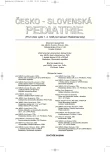Genetically Determined Forms of Nephrotic Syndrome in Children
Authors:
M. Malina; J. Janda; T. Seeman
Authors‘ workplace:
Pediatrická klinika UK 2. LF a FN Motol, Praha
přednosta prof. MUDr. J. Lebl, CSc.
Published in:
Čes-slov Pediat 2009; 64 (2): 77-82.
Category:
Review
Overview
Nephrotic syndrome (NS) is a common glomerulopathy in childhood. Beside idiopathic forms with unclear etiology, genetically determined forms occur. These monogenic forms essentially differ in treatment and patient’s prognosis from the idiopathic ones. They are also clinically and histologically indistinguishable. The only option of differential diagnosis is molecular genetic testing.
The most prominent genes causing genetically determined nephrotic syndrome are NPHS1, NPHS2, WT1 and LAMB2. Most of the cases of genetically caused NS are resistant to initial steroid therapy. In all patients with steroid-resistant nephrotic syndrome (SRNS) genetic background should be examined and genetically caused NS should be taken to differential diagnosis. Patients with SRNS should be molecularly genetically tested, at best at the time of renal biopsy.
Key words:
steroid-resistant nephrotic syndrome, podocin, WT1, NPHS2
Sources
1. Cho HY, et al. WT1 and NPHS2 mutations in Korean children with steroid-resistant nephrotic syndrome. Pediatr. Nephrol. 2008;23(1): 63–70.
2. Ehrich JH, et al. Steroid-resistant idiopathic childhood nephrosis: overdiagnosed and undertreated. Nephrol. Dial. Transplant. 2007;22(8): 2183–2193.
3. van den Berg JG, Weening JJ. Role of the immune system in the pathogenesis of idiopathic nephrotic syndrome. Clin. Sci. (Lond). 2004;107(2): 125–136.
4. Niaudet P. Genetic forms of nephrotic syndrome. Pediatr. Nephrol. 2004;19(12): 1313–1318.
5. Ruf RG, et al. Patients with mutations in NPHS2 (podocin) do not respond to standard steroid treatment of nephrotic syndrome. J. Am. Soc. Nephrol. 2004;15(3): 722–732.
6. Hodson EM, et al. Corticosteroid therapy for nephrotic syndrome in children. Cochrane Database Syst. Rev. 2004;(2): CD001533.
7. Mucha B, et al. Mutations in the Wilms’ tumor 1 gene cause isolated steroid resistant nephrotic syndrome and occur in exons 8 and 9. Pediatr. Res. 2006;59(2): 325–331.
8. Hinkes BG, et al. Nephrotic syndrome in the first year of life: two thirds of cases are caused by mutations in 4 genes (NPHS1, NPHS2, WT1, and LAMB2). Pediatrics 2007;119(4): e907–e919.
9. Kestila M, et al. Positionally cloned gene for a novel glomerular protein – nephrin – is mutated in congenital nephrotic syndrome. Mol. Cell 1998;1(4): 575–582.
10. Hinkes B, et al. Specific podocin mutations correlate with age of onset in steroid-resistant nephrotic syndrome. J. Am. Soc. Nephrol. 2008;19(2): 365–371.
11. Gbadegesin R, et al. Mutations in PLCE1 are a major cause of isolated diffuse mesangial sclerosis (IDMS). Nephrol. Dial. Transplant. 2008;23(4): 1291–1297.
12. Hinkes BG. NPHS3: new clues for understanding idiopathic nephrotic syndrome. Pediatr. Nephrol. 2008; 23/6) 847–850.
13. Hu M, et al. Prophylactic bilateral nephrectomies in two paediatric patients with missense mutations in the WT1 gene. Nephrol. Dial. Transplant. 2004;19(1): 223–226.
14. Zenker M, et al. Human laminin beta2 deficiency causes congenital nephrosis with mesangial sclerosis and distinct eye abnormalities. Hum. Mol. Genet. 2004;13(21): 2625–2632.
15. Lowik MM, et al. Focal segmental glomerulosclerosis in a patient homozygous for a CD2AP mutation. Kidney Int. 2007;72(10): 1198–1203.
16. Kaplan JM, et al. Mutations in ACTN4, encoding alpha-actinin-4, cause familial focal segmental glomerulosclerosis. Nat. Genet. 2000;24(3): 251–256.
17. Mukerji N, Damodaran TV, Winn MP. TRPC6 and FSGS: the latest TRP channelopathy. Biochim. Biophys. Acta 2007;1772(8): 859–868.
18. Winn MP, et al. Unexpected role of TRPC6 channel in familial nephrotic syndrome: does it have clinical implications? J. Am. Soc. Nephrol. 2006;17(2): 378–387.
19. Ruf RG, et al. Identification of the first gene locus (SSNS1) for steroid-sensitive nephrotic syndrome on chromosome 2p. J. Am. Soc. Nephrol. 2003;14(7): 1897–1900.
20. Fuchshuber A, et al. Clinical and genetic evaluation of familial steroid-responsive nephrotic syndrome in childhood. J. Am. Soc. Nephrol. 2001;12(2): 374–378.
Labels
Neonatology Paediatrics General practitioner for children and adolescentsArticle was published in
Czech-Slovak Pediatrics

2009 Issue 2
- What Effect Can Be Expected from Limosilactobacillus reuteri in Mucositis and Peri-Implantitis?
- The Importance of Limosilactobacillus reuteri in Administration to Diabetics with Gingivitis
-
All articles in this issue
- Reflux Strictures of Esophagus in Children – Therapy and Results
- Mental Anorexia or Brain Tumor?
- Vaccination against Tuberculosis
- Genetically Determined Forms of Nephrotic Syndrome in Children
- Flow-mediated Dilation (FMD) – Ultrasound Evaluation of Function of Vascular Endothelium in the Population Groups at Risk
- Monogenic Hypertension
- Czech-Slovak Pediatrics
- Journal archive
- Current issue
- About the journal
Most read in this issue
- Vaccination against Tuberculosis
- Genetically Determined Forms of Nephrotic Syndrome in Children
- Reflux Strictures of Esophagus in Children – Therapy and Results
- Monogenic Hypertension
